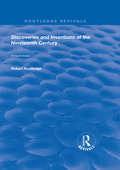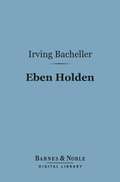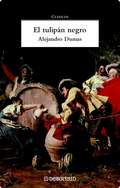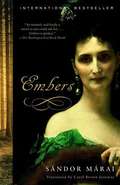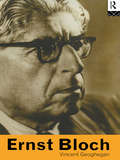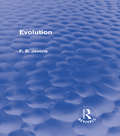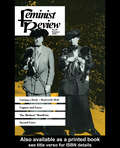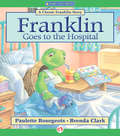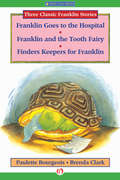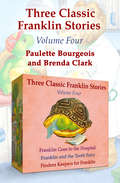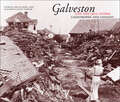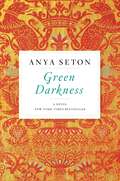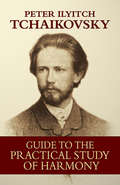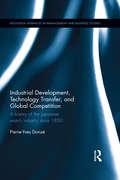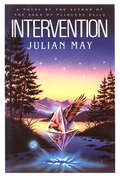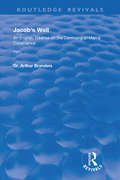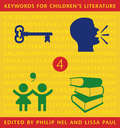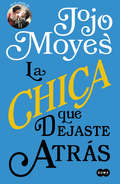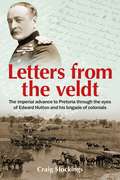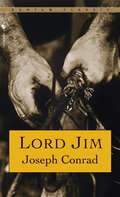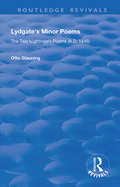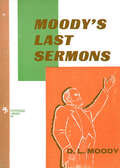- Table View
- List View
Discoveries and Inventions of the Ninteenth Century (Routledge Revivals)
by Robert RoutledgePublished in 1900. From Atoms to Warships and everything in between, Robert Routledge lists a vast and varied illustrated collection of the revolutionary advances in engineering and pioneering discoveries of the 19th century.
Eben Holden: A Tale of the North Country
by Irving BachellerThis is the tale of Eben Holden, a homely hired hand, and the archetype of the wise old man. It chronicles his flight with young Bill from Vermont to Paradise Valley and his role in Bill's childhood and coming of age in the Brower household. It is also about the courtship of Bill and Hope Brower.
El tulipán negro
by Alejandro DumasAlejandro Dumas padre es uno de los escritores mas prolificos del siglo XIX, con mas e 300 obras en su haber, escritas en su mayoria en fasciculos, ...Dos elementos vertebran las novelas de Dumas: la historia y la aventura. La ruptura con lo anterior que supusieron la Revolución francesa y Napoleón germinó en la vocación historicista de principios del siglo XIX. Se percibe el pasado como un romántico refugio consolador, donde se busca heroísmo y huida de la rutina. Dumas, pura exaltación de la individualidad, condena el prosaísmo de su época y la falta de ideales.
Embers (Vintage International)
by Sandor MaraiOriginally published in 1942 and now rediscovered to international acclaim, this taut and exquisitely structured novel by the Hungarian master Sandor Marai conjures the melancholy glamour of a decaying empire and the disillusioned wisdom of its last heirs. In a secluded woodland castle an old General prepares to receive a rare visitor, a man who was once his closest friend but who he has not seen in forty-one years. Over the ensuing hours host and guest will fight a duel of words and silences, accusations and evasions. They will exhume the memory of their friendship and that of the General's beautiful, long-dead wife. And they will return to the time the three of them last sat together following a hunt in the nearby forest--a hunt in which no game was taken but during which something was lost forever. Embers is a classic of modern European literature, a work whose poignant evocation of the past also seems like a prophetic glimpse into the moral abyss of the present
Ernst Bloch
by Vincent GeogheganErnst Bloch is perhaps best known for his subtle and imaginative investigation of utopias and utopianism, but his work also provides a comprehensive and insightful analysis of western culture, politics and society. Yet, because he has not been one of easiest of writers to read his full contribution has not been widely acknowledged. Block developed a complex conceptual framework, and presented this in a prose style which many have found to verge on the impenetrable. In this critical and accessible introduction to one of the most fascinating thinkers of the twentieth century, Vincent Geoghegan unravels much of the mystery of the man and his ideas.
Evolution (Routledge Revivals)
by F. B. JevonsFirst published in 1900, this philosophical essay on Evolution questions how the acceptance of Evolution as scientific should influence the thoughts and actions of humankind from the perspective of morality and moral conduct. In his discussion, Frank B. Jevons deals with such subjects as pessimism and optimism towards evolutionary theory, the laws of motion and matter, and the importance of scientific evidence.
Feminist Review: Issue 35
by The Feminist The Feminist Review CollectiveThis issue will cover the wide range of topics for which the journal is known and on which it has built its readership, rather than being a thematic issue.
Franklin Goes to the Hospital
by Paulette Bourgeois Brenda ClarkIn this Franklin Classic Storybook, our hero goes to the hospital for an operation to repair his broken shell, and everyone thinks he's being very brave. But Franklin is only pretending to be fearless. He's worried that his X-rays will show just how frightened he is inside. With the help of Dr. Bear, Franklin learns that even though he's feeling scared, he can still be brave.This fixed-layout ebook, which preserves the design and layout of the original print book, features read-along narration by the author as well as music and sound effects.
Franklin Goes to the Hospital, Franklin and the Tooth Fairy, and Finders Keepers for Franklin
by Paulette Bourgeois Brenda ClarkFranklin Goes to the HospitalIn this Franklin Classic Storybook, our hero goes to the hospital for an operation to repair his broken shell, and everyone thinks he's being very brave. But Franklin is only pretending to be fearless. He's worried that his X-rays will show just how frightened he is inside. With the help of Dr. Bear, Franklin learns that even though he's feeling scared, he can still be brave.Franklin and the Tooth FairyIn this Franklin Classic Storybook, our hero discovers that, unlike most of his friends, he doesn't have teeth, and worries that he's missing out on the Tooth Fairy's magical visits.Finders Keepers for FranklinIn this Franklin Classic Storybook, Franklin is very excited to find a camera. He knows that he should find the owner and return the camera, but his friends tell him "finders keepers!" and soon Franklin gets carried away taking pictures. With his father's encouragement, Franklin decides to return the camera to its rightful owner--but finding out who the owner is takes some clever sleuthing!
Franklin Goes to the Hospital, Franklin and the Tooth Fairy, and Finders Keepers for Franklin: Franklin Goes to the Hospital, Franklin and the Tooth Fairy, and Finders Keepers for Franklin (Classic Franklin Stories)
by Paulette Bourgeois Brenda ClarkFranklin Goes to the HospitalIn this Franklin Classic Storybook, our hero goes to the hospital for an operation to repair his broken shell, and everyone thinks he’s being very brave. But Franklin is only pretending to be fearless. He’s worried that his X-rays will show just how frightened he is inside. With the help of Dr. Bear, Franklin learns that even though he’s feeling scared, he can still be brave.Franklin and the Tooth FairyIn this Franklin Classic Storybook, our hero discovers that, unlike most of his friends, he doesn’t have teeth, and worries that he’s missing out on the Tooth Fairy’s magical visits.Finders Keepers for FranklinIn this Franklin Classic Storybook, Franklin is very excited to find a camera. He knows that he should find the owner and return the camera, but his friends tell him “finders keepers!” and soon Franklin gets carried away taking pictures. With his father’s encouragement, Franklin decides to return the camera to its rightful owner—but finding out who the owner is takes some clever sleuthing!
Galveston and the 1900 Storm: Catastrophe and Catalyst
by Patricia Bellis Bixel Elizabeth Hayes TurnerSpur Award Nominee: How Galveston, Texas, reinvented itself after historic disaster: “A riveting narrative . . . Absorbing [and] well-illustrated.” —Library JournalThe Galveston storm of 1900 reduced a cosmopolitan and economically vibrant city to a wreckage-strewn wasteland where survivors struggled without shelter, power, potable water, or even the means to summon help. At least 6,000 of the city's 38,000 residents died in the hurricane. Many observers predicted that Galveston would never recover and urged that the island be abandoned. Instead, the citizens of Galveston seized the opportunity, not just to rebuild, but to reinvent the city in a thoughtful, intentional way that reformed its government, gave women a larger role in its public life, and made it less vulnerable to future storms and flooding.This extensively illustrated history tells the full story of the 1900 Storm and its long-term effects. The authors draw on survivors’ accounts to vividly recreate the storm and its aftermath. They describe the work of local relief agencies, aided by Clara Barton and the American Red Cross, and show how their short-term efforts grew into lasting reforms. At the same time, the authors reveal that not all Galvestonians benefited from the city’s rebirth, as African Americans found themselves increasingly shut out from civic participation by Jim Crow segregation laws. As the centennial of the 1900 Storm prompts remembrance and reassessment, this complete account will be essential and fascinating reading for all who seek to understand Galveston’s destruction and rebirth.Runner-up, Spur Award for Best Western Nonfiction—Contemporary, Western Writers Of America
Green Darkness: A Novel
by Anya SetonA NEW YORK TIMES BESTSELLER. Exploring themes of love, reincarnation and good vs evil, the action starts when a 1960s guru sends a troubled American woman back over 400 years into a past life to save her marriage.Strange things are afoot after English aristocrat Richard Marsdon takes his new wife Celia, an American heiress, to his family home in Sussex. Richard acts out of character, and Celia is suffering a debilitating emotional breakdown.A friend of Celia’s mother, a wise, Hindu mystic, realizes the couple is haunted by an event from their past lives, and the only way to repair the damage is to send Celia back in time. The heiress journeys back almost four hundred years to the reign of Edward VI and her former life as the servant girl Celia de Bohun—and her doomed love affair with the chaplain Stephen Marsdon. Although Celia and Stephen can’t escape the horrifying consequences of their love, fate—and time—offer them another chance for redemption.
Guide to the Practical Study of Harmony (Dover Books on Music)
by Peter Ilyitch TchaikovskyWritten during Tchaikovsky’s years as professor at the renowned Moscow Conservatory, this volume presents a clear and thorough introduction to the study of harmony. The great Russian composer expounded upon his views of music while he was in the full flower of his creative powers, offering students a chance to learn the discipline’s fundamentals from one of its great masters. Out of print for decades and exceedingly rare in its original edition, Tchaikovsky’s Guide to the Practical Study of Harmony possesses an intrinsic historical interest, yet remains as useful and instructive today as it was a century ago. A complete course in writing music, this excellent manual features numerous examples and exercises. It functions equally well as a classroom text, an adjunct to private instruction, or as a guide to individual musicians.
Industrial Development, Technology Transfer, and Global Competition: A history of the Japanese watch industry since 1850 (Routledge Advances in Management and Business Studies)
by Pierre-Yves DonzeThe phenomena of Japan emerging as one of the most competitive industrial nations in the twentieth century and the general shift of competitiveness to East Asia since the 1980s have been widely studied by many scholars from different fields of the social sciences. Drawing on sources from Japanese, Swiss, and American archives, the historical analysis of this book tackles a wide range of actors and sheds light on the various processes that enabled Japanese watch companies to transfer technology and expand commercially starting in the second half of the nineteenth century. By exploring the case of the watch industry, this book serves to establish a better understanding of the origins of the competitiveness of Japanese manufacturing and its evolution until its decline in the post‐bubble economy (in the 1990s and 2000s).
Intervention: A Novel (The Saga of Pliocene Exile #1)
by Julian MayAn origin story of Julian May&’s Galactic Milieu Trilogy and a link to her Saga of Pliocene Exile—&“a superb piece of speculative fiction&” (Library Journal). They have always been among us—the telepaths, the persons possessing higher mind-powers that have been called &“metapsychic&”—but they have always been few and far between and their abilities weak or erratic. Until now . . . Human evolution makes a quantum leap. And all over the world, people begin to be born with extraordinary minds. Some of them are geniuses and some are very ordinary. But all of these metapsychic operants have mind-powers that &“normal&” humanity considers amazing—and dangerous. Intervention paints this advent of Homo superior in a broad and colorful chronicle that begins in 1945 and culminates in 2013. Its many characters reveal the impact of higher mind-powers upon the possessors themselves, upon their &“normal&” associates, and upon a troubled society striving to avoid nuclear annihilation. The metapsychic operants are secretive and fearful at first. When they reveal themselves they are regarded with awe, exploited, and finally persecuted. They are torn by the dilemma of what role to play: are they destined to save the &“normal&” from global war, even if it means that they must use their mental powers to subjugate the race that gave birth to them? The book&’s principal protagonists are members of the Remillard family of New Hampshire—whose descendants are featured in Julian May&’s worldwide bestselling Saga of Pliocene Exile. Intervention details with humor, thundering action, and scientific insight a world where the human mind does much more than think—a world that is fantastic, but by no means implausible.
Jacob's Well: An English Treatise on the Cleansing of Man's Conscience (Routledge Revivals)
by Arthur Dr BrandelsFirst published in 1900, this volume was edited from a unique 1440 A.D. manuscript residing in Salisbury Cathedral. As a penitential manual, it joined others of its time such as Handlyng Synne and Parson’s Tale and is one of the more voluminous treatises. The fundamental allegory of this Middle-English text is of the well of mire representing the sins of humanity and how it may be cleaned to become a fit receptacle of Grace as we may also cleanse ourselves and our consciences. This volume consists of a modest introduction followed by the Middle-English text Jacob’s Well along with glosses.
Keywords for Children’s Literature
by Philip Nel Lissa PaulThe study of children's literature and culture has been experiencing a renaissance, with vital new work proliferating across many areas of interest. Mapping this vibrant scholarship, Keywords for Children's Literature presents 49 original essays on the essential terms and concepts of the field. From Aesthetics to Young Adult, an impressive, multidisciplinary cast of scholars explores the vocabulary central to the study of children's literature. Following the growth of his or her word, each author traces its branching uses and meanings, often into unfamiliar disciplinary territories: Award-winning novelist Philip Pullman writes about Intentionality, Education expert Margaret Meek Spencer addresses Reading, literary scholar Peter Hunt historicizes Children's Literature, Psychologist Hugh Crago examines Story, librarian and founder of the influential Child_Lit litserv Michael Joseph investigates Liminality. The scope, clarity, and interdisciplinary play between concepts make this collection essential reading for all scholars in the field. In the spirit of Raymond Williams' seminal Keywords, this book is a snapshot of a vocabulary of children's literature that is changing, expanding, and ever unfinished.
La chica que dejaste atrás
by Jojo MoyesLa autora de Yo antes de ti vuelve con una historia que te emocionará. Dos mujeres separadas por un siglo pero unidas por su determinación a luchar por lo que más aman.A cualquier precio. En 1916 el artista francés Édouard Lefèvre ha de dejar a su mujer, Sophie, para luchar en el frente. Cuando su ciudad cae en manos de los alemanes, ella se ve forzada a acoger a los oficiales que cada noche llegan al hotel que regenta. Y desde el momento en que el nuevo comandante posa su mirada en el retrato que Édouard pintó a su esposa nace en él una oscura obsesión que obligará a Sophie a arriesgarlo todo y tomar una terrible decisión. Casi un siglo más tarde, el retrato de Sophie llega a manos de Liv Halston como regalo de boda de su marido poco antes de su repentina muerte. Su belleza le recuerda su corta historia de amor. Pero cuando un encuentro casual revela el verdadero valor de la obra, comienza la batalla por su turbulenta historia, una historia que está a punto de resurgir, arrastrando con ella la vida de Liv. La crítica ha dicho...«Una clase magistral de escritura que los fans de Yo antes de ti adorarán.»Elle «Una verdadera obra de arte.»Fabulous «Jojo Moyes hila con maestría los hilos de esta historia agridulce en una novela irresistible.»Entertainment Weekly «Un homenaje a la audacia, la determinación y la inteligencia.»Los Angeles Times «Moyes escribe historias deliciosas con personajes tan reales que parecen saltar de las páginas.»USA Today «Liv y Sophie son tan reales en sus defectos, sus pasiones y su valentía que arrastran al lector hasta la última página.»Library Journal «Moyes escribe con tal claridad que uno casi puede ver el cuadro centenario que se sitúa en elcentro de la trama de esta maravillosa novela. Una historia de amor excepcional.»Booklist
Landing Zones: Southern Veterans Remember Vietnam
by James R. WilsonLanding Zones brings to life the dramatic, gripping, and often painful stories of twenty-four Vietnam Veterans from the American South. The men and women interviewed here represent a remarkable range of experience, including a marine rifleman, a helicopter pilot, an army nurse, a prisoner of war, a riverboat gunner, and the commanding general William Westmoreland. Skillfully interviewed by James R. Wilson, a journalist and Army press officer in Vietnam, each narrative explores and describes the war's events before following the veterans home and carrying them to the present.These stories focus on a uniquely southern view of Vietnam. In terms of numbers the South shouldered more than its share of human cost--31 percent of Americans who served came from one of the eleven states of the old Confederacy, and 28 percent of the dead were southerners. Southerners also brought to Vietnam certain shared cultural tastes and a particularly southern heritage of honor in military service stemming from the Civil War. For many, as their testimony reveals, a sense of patriotism was tested and questioned by the horrors of war, and for others that patriotism was a continued source of strength.Individually and collectively, however, these oral histories make up a picture of war that prevents us from forgetting the truth as one veteran put it: "Vietnam was not one war, but a thousand little nasty wars."
Letters from the Veldt: The imperial advance to Pretoria through the eyes of Edward Hutton and his brigade of colonials.
by Craig StockingsThe South African War – or Boer War – running from 11 October 1899 until 31 May 1902 –was the largest British military effort since the Napoleonic Wars. It was also the first time that large-scale, meaningful contributions were made to an active theatre of war by the self-governing colonies. This included formal contributions of around 20,000 troops from the Australian colonies which dwarfed all previous Australian military commitments. Just as the war was a watershed event for the development and professionalisation of the British Army from 1902-14, it was momentous for the self-governing colonies in Australia and elsewhere in social, political and most certainly in military terms.Letters from the Veldt sheds light on the activities of imperial military contingents – in which Australians served – during the Imperial march to Pretoria from May-September 1900, the successful conclusion of which marked the end of &‘conventional&’ operations in South Africa and the beginning of the &‘guerrilla&’ phase that would drag on until May 1902. A large proportion of colonial troops serving in South Africa at this point did so as part of the 1st Mounted Infantry Brigade. Despite their importance, the experiences of this brigade have not figured largely in existing any accounts of the Boer War. The brigade itself was composed of not only Australians, but Canadians, New Zealanders, and British regular and volunteer troops, and a scattering of &‘loyal&’ South Africans. It was in many ways a microcosm of imperial military cooperation; an important part of the steady development of attitudes, expectations and shared experience which led to the formation in 1914 of a much larger expeditionary force. This account does not follow a standard pattern or format – there is no measured, steady traditional narrative. Rather, the experiences of the 1st Mounted Infantry Brigade, and the light they shed on many wider issues, are presented through letters written home by its British commander, Major General Edward Thomas Henry &‘Curly&’ Hutton – himself a little-known yet key figure in the early history of the Australian military. Read within their context, the Boer War letters of Major General Edward Hutton offer a window not only into the course and conduct of the imperial advance to Pretoria, but also a lens through which to better understand a range of wider issues that framed his world – the world of Australian military history before the term Anzac was coined.
Lord Jim: Large Print
by Joseph ConradClassic Conrad novel. According to Wikipedia: "Joseph Conrad (1857 – 1924) was a Polish-born English novelist. Many critics regard him as one of the greatest novelists in the English language-a fact that is remarkable, as he did not learn to speak English fluently until he was in his twenties (and always with a strong Polish accent). He became a naturalized British subject in 1886. Conrad is recognized as a master prose stylist. Some of his works have a strain of romanticism, but more importantly he is recognized as an important forerunner of modernist literature. His narrative style and anti-heroic characters have influenced many writers, including Ernest Hemingway, D. H. Lawrence, F. Scott Fitzgerald, Graham Greene, William S. Burroughs, Joseph Heller, V. S. Naipaul, Italo Calvino and J. M. Coetzee. "
Lydgate's Minor Poems: The Two Nightingale Poems (A.D. 1446) (Routledge Revivals #No. 80)
by Otto GlauningFirst published in 1900, this volume includes the two versions of Lydgate’s Middle-English Nightingale poems along with glosses. A detailed scholarly introduction is provided by Otto Glauning, PhD, including analysis of the manuscripts, metre, linguistic significance and the manuscripts’ sources.
Moody's Last Sermons (Colportage Library #86)
by Dwight L. MoodyThe great preacher D. L. Moody's last words are worthy of reflection. The Ninety-First Psalm, his last address, declares God's seven "I will's." Other sermons deal with revivals, the transfiguration, God's questions, Romans 8, Mary and Martha, and temptation. You will find marvelous messages on pertinent and perennial topics.
